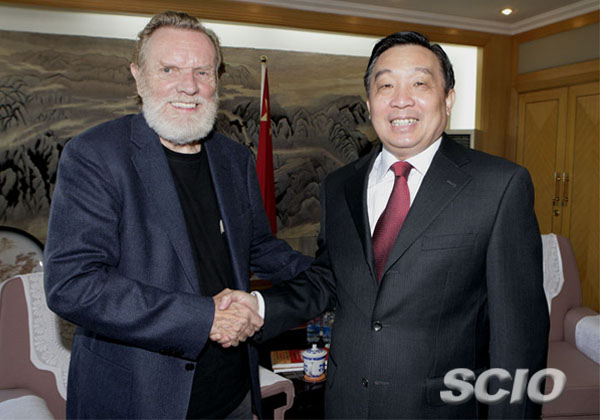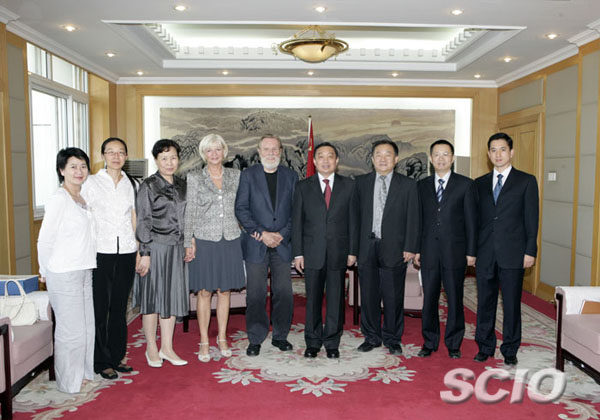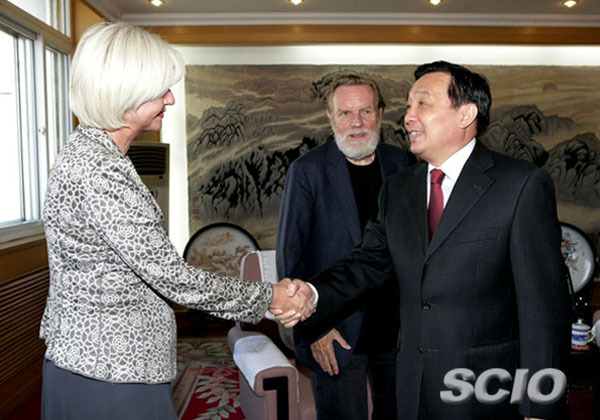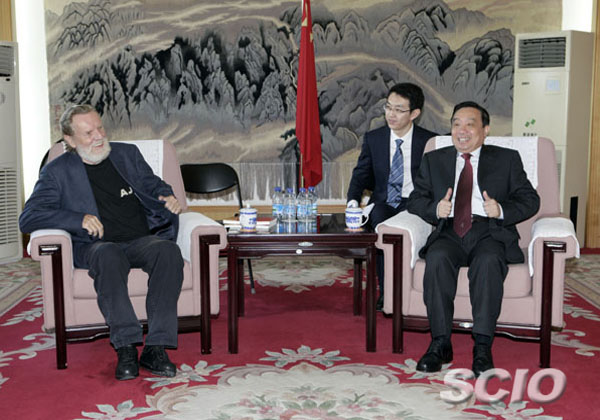On the Diane Rehm show, the host interviews John and Doris Naisbitt about their book, “China’s Megatrends: The 8 Pillars of a New Society” According to the book’s promotional materials:
China is creating an entirely new social and economic model, fitting to Chinese history and society just as America created a model fitting its history and society more than 200 years ago. [Naisbitt] identifies eight pillars of this new system.
The Emanicipation of the Mind
Planning by Trial and Error
The Limits of Freedom and Fairness
Framing the Forest, Letting the Trees Grow
Balancing Top-down with Bottom-up
Artistic and Intellectual Ferment
Joining the World Stage
The Mighty River of Innovation
When asked by Rehm why the Chinese government bans websites such as YouTube, Twitter, and Facebook, John Naisbitt replies, “Because there are things on those websites that do not contribute to the stability of the country.” He later replied to a caller by misinforming him that Liu Xiaobo was arrested “not for speaking his mind,” but for “organizing an alternative government.” Listen to the interview here. Learn more about the Naisbitts and their work in China at their China Institute’s website.
Updated: How are the Naisbitts and their new book viewed in China? Here are some illustrative examples:
(1) From the official website of China’s State Council Information Office (SCIO is the Chinese government’s main propaganda organ, which is in charge of “explaining China to the world 向世界说明中国” as well as controlling the content of the domestic Internet.):
On September 12, 2009, the Director of the State Council Information Office Wang Chen (王晨) met authors of “China’s Megatrends” John and Doris Naisbitt in the offices of SCIO.
Jiang Wenqiang (江伟强), the Director of the Second Bureau of SCIO (Second Bureau is in charge of “developing international public relations, promoting communication and collaboration with foreign news agencies and other relevant agencies”), Guo Changjian (郭长建), the Director of the Third Bureau of SCIO (Third Bureau is in charge of “planning and organizing books, films, and videos for foreign audiences and other general cultural exchange activities”), and Wu Wei (吴伟), the deputy director of the Third Bureau of SCIO also attended the meeting.
9月12日,国务院新闻办公室主任王晨在本办会见了《中国大趋势》作者约翰·奈斯比特夫妇一行。
国新办二局局长,三局局长郭长建、副局长吴伟等会见时在座。
(2) The following text, “《中国大趋势》作者:江主席鼓励我“讲故事”, (“China’s Megatrends” Author: President Jiang Encouraged Me to “Tell the Story”) was published on over 220 Chinese websites including Xinhua, People’s Net, and China Net, under the byline Mr. and Mrs. John Naisbitt (约翰·奈斯比特夫妇) in October 2009. Excerpts translated by CDT:
For many years I feared regret, afraid of missing the most precious opportunity of my life. That was 1996, and the person who provided such a precious opportunity was one of the most powerful people in the world, the President of China, Jiang Zemin.
多年来我一直心存遗憾,担心自己错过了生命中最宝贵的一次机会。那是在1996年,提供这一宝贵机会的是当时世界最有权力的人物之一:中国国家主席江泽民。
President Jiang had a private meeting with me in Zhongnanhai, Beijing. The specific location was the meeting room Mao Zedong once used. The reason President Jiang invited me was because I wrote a book “Megatrends” in 1982. It analyzed the changes in economics, politics, society and culture in the United States. The book proudly sat on the New York Times bestseller list for two years, and for most of that time was number one on the list. It also sold very well globally. “Megatrends” also entered China, and what surprised me was that the book probably sold 20 million copies in China, but all pirated copies. This was a common phenomenon then. Those who grew up during the Cultural Revolution had just graduated from college, and they eagerly wanted to understand the west. “You don’t even know how big your name is in China.” This is the opening line President Jiang said to me.
江主席在北京中南海与我进行了私人会谈,具体地点就在毛泽东当年的会客室。江主席之所以邀请我是因为我在1982年所写的一本书:《大趋势》。它分析的是美国经济、政治、社会和文化的变革。该书雄踞《纽约时报》畅销书排行榜两年之久,而且大部分时间都是排在第一位,在全球范围内该书的销量也甚佳。《大趋势》一书甚至还进入了中国,令我惊讶的是我得知该书在中国的销量可能达到了2000万册,不过都是盗版,这是当时很普遍的一个现象。“文革”后成长起来的一代刚刚大学毕业,急切地想要了解西方。“你都不知道你自己在中国名气多么大。”这就是江主席的开场白。
Right before I visited Beijing I stayed a few days in Taipei. This was just a crucial time in the China-US relationship. After China launched missiles at Taiwan’s water, President Clinton sent Aircraft-carriers to the region. War between the US and China at the Taiwan Straits could break out at any moment; therefore we could not avoid Taiwan during our two hour conversation. I have visited China and Taiwan many times since 1967, and witnessed the huge changes on both sides. Therefore I have some credentials to speak on this issue. I felt that I have to say something about Taiwan’s excellent propaganda and China’s low-key approach. So I said: “President Jiang, Taiwan is a small story. But it tells it very well. China has a big story; it’s a pity it’s being told poorly.”
President Jiang thought for a moment and said: Why don’t you tell this story?
在访问北京之前我还在台北逗留了几天。当时正是中美关系的关键期。在中国向台湾水域发射导弹之后,克林顿总统立刻派出航空母舰到达该区域。中美两国在台湾海域的战争一触即发,因此台湾是一个无法回避的问题,很快也就成为我们两小时会谈中的话题。从1967年开始,我曾多次访问中国大陆和台湾,亲眼目睹了两边的巨变。因此在这个问题上具有一定的发言权。我觉得对于台湾的良好宣传和中国大陆的低调态度不吐不快,于是说,“江主席,台湾是个小故事,但它讲得很好。大陆有个大故事可讲,可惜讲得很糟。”
江主席沉思了一下说,你为什么不来讲这个故事呢?
(3) The following excerpts are from “It’s Time To Stop the Absurd Promotion of ‘China’s Megatrends’,” by Guangzhou-based writer and book critic Zhang Yuchuan 郑渝川, translated by CDT:
If this can be counted as a task assigned by China’s (former) leader, I don’t think John Naisbitt accomplished it with the book “China’s Megatrends”
如果这算得上是我国(前)领导人的一个委托的话,我不认为约翰·奈斯比特通过《中国大趋势》一书而如愿完成了。
“China’s Megatrends” quotes original speeches of Chinese leaders in different positions and at different times, reports from the National People’s Congress and Party Congress meetings, at length from beginning to end, purposely avoiding discussing key concepts in a logical way which would be familiar to western readers, and jumping around to list the achievements of China’s developments. The way it describes China’s reality will only turn foreign readers off, and the so-called megatrends predictions have no valid ground.
《中国大趋势》通篇大段引用我国各任各位领导人原话、人大报告、党代会报告,刻意回避西方读者习以为常的关键概念讨论,以跳跃式语序罗列中国的发展成就,其现状描述只会遭致外国读者的反感,所谓趋势判断更是无法成立。
From the point of view of an ordinary Chinese reader, I also do not think “China’s Megatrend” is a serious book. … The fatal failure of the book is that the author’s information and sources are very narrow. Other than official reports, and Party newspaper articles, there were only a few interviewees. The author has no first-hand observations or analysis from China’s different regions or different fields, nor did he quote reports and views from more commercialized Chinese media which are more reflective and critical.
而从一个普通中国读者的视角,我同样不认为《中国大趋势》是本严谨的论著。… 全书最大的致命伤则是,作者的信息、资料来源非常片面,除了官方报告、党报报道就是那么几个寥寥可数的受访对象,未曾有进入中国东中西各区域基层、农工商一线观察分析经历,也不见其引用中国国内真正稍具批评性、反思性的市场化媒体的报道成果和观点。
(4) A review on the cultural channel of Hebei Fazhi Net, author: Diao Junjie (刁军杰), excerpts translated by CDT:
“China’s Megatrends”: A Book of Cheating by John Naisbitt!
《中国大趋势》:约翰•奈斯比特的骗人之作!The author takes propaganda in the official media and some speeches of high-level leaders as reality to describe and affirm; in this sense, this book is just a pile of propaganda published in the name of John Naisbitt. If one says this book is a review of the last thirty years of China’s development and speculation of the future, it is far less rich and in-depth than other books already published inside China. It’s depth is even less than an educated staff at the lowest level of the propaganda department.
作者把官方媒体的宣传和高层领导的一些讲话,全部当成了现实来加以肯定和叙述,从这个意义上说,该书不过是一本以约翰•奈斯比特名义出版的宣传资料而已。如果说该书是对中国近三十年发展的回顾(总结)和对未来的展望,它远不如国内已经出版的那些著作丰富和深刻,它的深度甚至还没有达到宣传机构一个有文化的科员的水平。
Facing such a shallow and mediocre book, there is no need to discuss it.
面对这样一本浅薄、平庸的著作,实在没有讨论的必要。
From Hangzhou-based author Fu Guoyong (傅国涌), excerpts translated by CDT:
The Misleading of John Naisbitt, the author of “China’s Megatrends”
《中国大趋势》作者约翰·奈斯比特的误导Under the invitation of the Chinese government, John Naisbitt, author of “Megatrends,” wrote a book called “China’s Megatrends.” It scratched together so-called “eight pillars” of new society, especially raising the concept of “Vertical Democracy” which differs from “Horizontal Democracy,” to apologize for the current political system. To put it plainly, it is propaganda. There is no intellectual value in it. As a foreigner, standing at the side of China’s ruling cliques, speaking plausibly on behalf of their interests, John Naisbitt is not the first one in last sixty years, nor the last.
写过《大趋势》的约翰·奈斯比特应中国官方之邀写了一本《中国大趋势》,拼凑出所谓的新社会的“八大支柱”,特别提出了不同于“水平式民主”的“垂直式民主”,为中国现行的政治体制辩护,说白了也就是一种宣传,没有什么思想价值。作为一个外国人,而站在中国的权势集团一边,振振有词地为他们的利益说话,约翰·奈斯比特不是六十年来第一人,也不会是最后一个,
If John Naisbitt had no contact with the Chinese government before, and self-initiated and completed this “China’s Megatrend” independently, then it is no big deal that he thinks the Chinese system is more advanced then the American system. In a plural, open society like America’s, everyone is entitled to their own opinion. He has freedom of speech, and we can just laugh about his book, that’s all. Unfortunately, as early as 1996, Jiang Zemin asked him to his face to tell the China story. Eleven years later, “an official of the Chinese government” again came to see him, and asked him to write a book about China’s megatrends. Therefore, it is very hard for this so-called “Vertical democracy” vs “Horizontal democracy” to escape the skepticism of propaganda and appeasement.
假如约翰·奈斯比特事先与中国官方没有接触,完全自发、独立地完成这本《中国大趋势》,那么,在美国这样多元、开放的社会,每个人都可以持有自己的独特见解,他认为中国的制度比美国优越也没有什么,不过是一家之言罢了,他有他的言论自由,一笑置之可矣。很不幸,早在1996年,江泽民就当面请他来讲中国故事,“我们会给你所有你要的支持”,11年后,“中国的政府官员”再度找到他,请他写一本中国的大趋势。所谓“垂直式民主”、“纵向式民主”,因此就很难逃脱迎合和宣传的嫌疑。
Robert Lawrence Kuhn and John Naisbitt and other similar Americans came on the stage one after another, to defend China’s true condition of freedom and democracy. Not as China really has freedom and democracy; on the contrary, this is exactly what we do not have. Therefore they need to re-explain everything to persuade Chinese people to accept the reality. This is a tactical change of propaganda methodology of the Chinese government, using foreigner’s names to deceive Chinese people. This also shows us the bankruptcy of the official propaganda; it has lost confidence in everything it’s saying, and needs to borrow external forces. These years, we have to admit that the government is also changing in its ruling techniques, to adapt to the changing society. Change is the trend, the unstoppable megatrend. The megatrend of China boils down to one word: change! Is it peacefully evolving in the direction of democracy and freedom? Or continuing to change in the direction of authoritarian dictatorship then collapse? Maybe John Naisbitt could not see this trend, or maybe he could see it but did not tell the truth.库恩、约翰·奈斯比特这些美国人相继高调出场,为现实中国的自由、民主辩护,并不是中国大陆有了真正的自由、民主,恰恰相反,这是我们所没有的,因此他们要把现有一切做出重新解释,说服中国人接受现实。这是官方在宣传手法上的技术性改变,就是挟外人以骗百姓。这也证明官方宣传的破产,对自己说的一切已失去了自信,需要借助外力。这些年来,在统治技术层面,我们不得不承认,官方也在变化,不断地适应眼前这个变化中的生活。变化是一种趋势,不可抵挡的大趋势,中国的大趋势,归根结底就是一个变字,是往民主、自由的方向和平演变,还是继续往专制、独裁的方向演变然后分崩离析,也许这是约翰 奈斯比特看不到的,也许他看到了而不说穿。
More photos of John and Doris Naisbitt from the State Council Information Office’s site:












